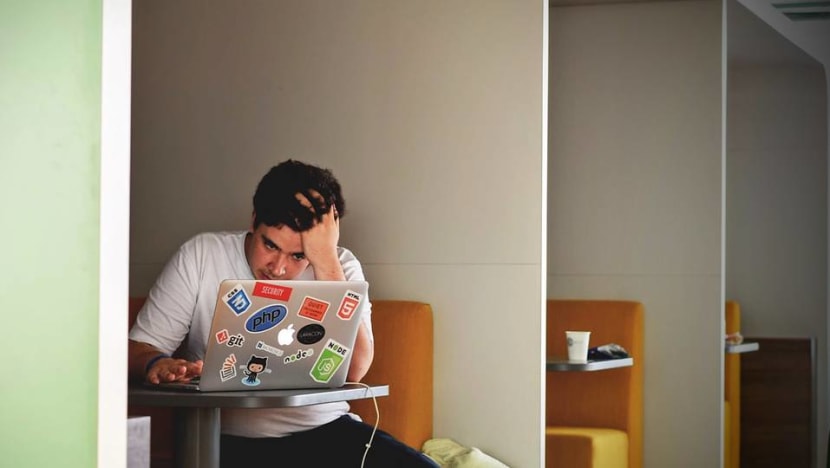commentary Commentary
Commentary: An ironman mentality is leading many to turn up for work despite being sick
Turning up sick at work can cause your employer to lose more money than if you had stayed home, says one observer.

A man working on a sticker-covered laptop in a coffee shop. (Photo:Unsplash/Tim Gouw)
SINGAPORE: Back when I was an undergraduate student in the United States, I interned at the University’s Career Placement Centre by assisting students in their job search.
Once, I caught the flu bug, but being the ever-industrious Singaporean, I took some medicine and turned up at work.
Unfortunately, the sight of me blowing my nose twice in the space of three minutes convinced the manager to send me home. My appeals to remain at work were but to no avail.
The manager then donned a face mask and sprayed down the entire office meticulously with anti-virus spray, as if I was patient zero for a viral epidemic. She then chided me for coming to work, risking the spread of the flu in the office. I left feeling rather amused at the whole incident.
These days, I am less amused.
Most of us are aware of the practice of absenteeism, where one is intentionally absent from work. However, what happens when someone turns up at work despite being ill? Professor Cary Cooper at Lancaster University identified this type of behaviour as “presenteeism”.
PRESENTEEISM IS EXPENSIVE
Presenteeism is more damaging to the economy than absenteeism and can cost billions annually in productivity loss.
A widely cited 2004 American Productivity Audit-Stewart survey found that the United States sees productivity loss attributed to presenteeism of US$150 billion (S$206 billion) each year.
In the United Kingdom, the Centre for Mental Health calculated that presenteeism from mental ill health alone costs the UK economy £15.1 billion (S$27 billion) each year. Most recently, a 2016 report by Pathology Awareness Australia found presenteeism cost the Australian economy more than A$34 billion per year (S$33.5 billion).
The organisational cost aside, presenteeism may actually lead to poorer personal health.
READ: Why nobody will thank you for soldiering on at work, a commentary

A British medical study on civil servants compared those who took no medical leave despite their illness with those who took some medical leave when they were ill.
Ill civil servants who did not take any medical leave were two times more likely to suffer a serious coronary event. It seems working while ill may cause psychological burden and stress to accumulate, which can lead to a heart attack. Other studies show individuals take longer to recover and may affect future physical and mental health.
Why does presenteeism cost so much? The high cost of presenteeism may be attributed to surprisingly minor ailments such as throat conditions, fever, headaches, flu and cough, according to researcher Hesan Quazi.
However, the impact of working in spite of these ailments lead to poorer work quality, teamwork and lower concentration. These contribute to a reduced output per hour worked and ultimately add up to billions of dollars in lost productivity.
Strange as it might sound, by turning up sick at work to display how hardworking you are, you actually cause your company to lose more money than if you had stayed home.
Those who do may lose concentration more easily, take longer to process instructions or waste precious time undoing errors.
For jobs that require precision and attention to detail, such lapses may result in monetary losses or even risk to human lives.
READ: Our workplaces are filthy and it’s costing us all, a commentary

Some illnesses may also be contagious – whether because of the easy transmission of airborne diseases or the spread of viruses and bacteria through commonly used items such as door handles or the buttons on an elevator and the photocopier machine. This in turn causes other colleagues to be sick.
IRON MAN MENTALITY
The underlying assumption to presenteeism is that people treat their work seriously and are insecure about losing their job. Quazi proposed a host of reasons as to why presenteeism persists.
For those paid on a per-project or per-hour basis, some turn up to work sick for the extra salary.
Sometimes, employees face deadlines closing on them. They might feel they have little choice but to put up with the illness and work towards the deadline.
Others believe in the need to be visible to their superiors and display commitment to work despite being ill. These employees seek to project the image that they are hard workers and team players. There is also the fear that absence from work for even a day would present a rival colleague with the opportunity to shine.
READ: Toxic workplaces are feeding the imposter phenomenon, a commentary
On a more egotistical note, individuals may exhibit the “Iron Man Mentality” – where one believes missing work is not acceptable and is a sign of weakness - or subscribe to the “Indispensible Man Theory”, where the highly committed believe the organisation cannot function without their presence.

MINDSET CHANGE IS NEEDED
Changing mindsets in presenteeism is an uphill battle. The employer might feel that the absent employee is a liability to the business. The employee in turn responds to such concerns by practising presenteeism.
Some Singaporean businesses are taking steps to tackle this issue. For example, local company, Concorde Security, a provider of Security Officers, has to ensure that all staff turn up for work in a timely manner at their respective locations.
Failure to provide the stipulated number of guards would result in stiff penalties. Yet, guards who turn up for work ill may not be in an ideal position to do their job well, compromising on the safety and security of people and facilities.
So Executive Director Alan Chua taps on technology to assist his staff. He utilises multiple devices, sensors and visual recognition software, empowering security specialists in a mobile command post to respond to incidents.
If the security specialist is taken ill and is not able to carry out their duties, colleagues can use these technologies to seamlessly cover their duties without compromise to operational security.
READ: If you need that MC tomorrow, just take it
SOLUTION STARTS FROM THE TOP
Employers must acknowledge that presenteeism is a problem that affects their bottom line. To reverse this culture, it must first start from the top.
The enlightened leader should focus on the delivery of results and re-designing jobs rather than value face time. Promoting healthy eating and an active lifestyle among employees will not hurt either.

Once leaders set the tone for a mindset change, they pave the way for the exploration of viable alternatives to support employees.
Organisations might, for instance, explore the use of video conferencing to allow sick employees to be present at an important meeting. The employee joins in for the duration of the meeting remotely and then subsequently recuperates at home.
Other organisations have also encouraged the use of Statement of Medical Fitness or Fit Notes. Rather than getting doctors to write Medical Certificates, some doctors state what work the ill individual is suitable for or what work they should be exempt.
Those who have been through National Service would be familiar with the medical officer’s prescription of “Attend B” or “Attend C” to respectively denote a person’s fitness for light duties and complete rest.
For presenteeism, the buck must stop with organisational leaders. Seeing everyone present at work might give false confidence when an ill employee cannot contribute effectively.
Ultimately, we all become poorer financially and physically if we miss the forest for the trees.
Dr Paul Lim is a Lecturer of Organisational Behaviour and Human Resources with the Lee Kong Chian School of Business at the Singapore Management University. His research focuses on the areas of Millennials, Mentoring and Resilience.
















